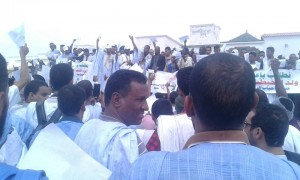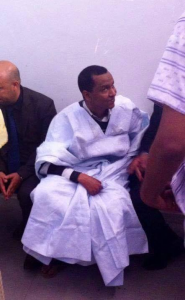A blogger imprisoned in Mauritania for almost four years, and who at various times was sentenced to death, now looks set to be released. The IHEU welcomes and celebrates the release of Mohamed M’kheitir, but insists that his welfare and security must be ensured.

A crowd outside the court last year, demanding the execution of Mohamed Cheikh Ould M’kheitir
Mohamed Cheikh Ould M’kheitir (or Mkhaitir) was first arrested and detained early in 2014, over an article in which he questioned the religious justifications given for Mauritania’s caste system and indentured servitude. Accused of ‘insulting Mohamed’ and ‘apostasy’, M’kheitir was sentenced to death in December 2014.
This satisfied the demand from huge crowds of his countrymen, who have gathered outside court at almost every appearance he has made, demanding his execution for his supposed religious transgressions. Politicians including the president also publicly condemned M’kheitir.
The International Humanist and Ethical Union (IHEU) has monitored and campaigned on the case frequently. M’kheitir’s story is featured in the IHEU Freedom of Thought Report country entry for Mauritania, we condemned the initial death sentence, and challenged his “apostasy” conviction multiple times at the Human Rights Council in Geneva, for example as part of our criticism of states that imprison supposed ‘blasphemers’ and when highlighting the wider harassment of anti-slavery campaigners. His case was the focus of our most recent UPR (Universal Periodic Review) submission on Mauritania, and we have also been involved in back channel efforts to pressure Mauritania into releasing M’kheitir. Read our full briefing from November 2016 which contains information on the trial process and the original article for which he was condemned.

A rare photo of M’kheitir since his arrest, at the appeals court in April 2016
“Our immediate concern now, given the intense and widespread incitement to violence against Mohamed M’kheitir, is that the state must provide the highest level of security for his protection,” comments IHEU Director of Communications and Campaigns, Bob Churchill. “Mohamed M’kheitir’s safety must be ensured and this almost certainly means he must be granted safe passage out of the country.
“Longer term, if M’kheitir’s release is a victory for the members of the international community and the human rights groups that have been pressuring Mauritania for justice, it is a victory that leaves far too many open questions. Will the next Mohamed M’kheitir face the same long ordeal in jail? Will he or she face a death sentence? Will he or she be bombarded with death threats, even in the courtroom itself? Will the nation’s president stand in front of a crowd which is demanding death, and tell the crowd that they are the ones in the right?”
Through several court hearings and appeals over the years, the case against M’kheitir various hinged on whether his words ‘insulted religion’ and whether they proved he was an ‘apostate’ from Islam. Early on, legal representation had to be flown in from overseas because local advocates prepared to defend M’kheitir could not be found, and the courts themselves were besieged with protesters demanding that M’kheitir should be executed.
“Massive reform is needed to prevent repetitions of this legal disaster and personal horror story,” says Churchill. “It can begin with legal reform: blasphemy and apostasy should never be criminal offences, let alone punishable by death; trials must be fair and advocates protected.
“Furthermore, the Mauritanian government must learn from other country’s which are also dealing with rising religious fundamentalism domestically. Learn that if governments make concessions to, or incorporate into themselves, the extremist demands of fundamentalists, however popular those demands may be, then the fundamentalists will not be placated, and the demands will only come thicker and faster. It’s time to reverse course and replace the narrative of religious nationalism with a narrative of human rights, freedom of expression, and secular justice.”